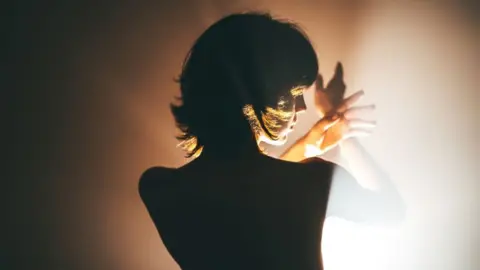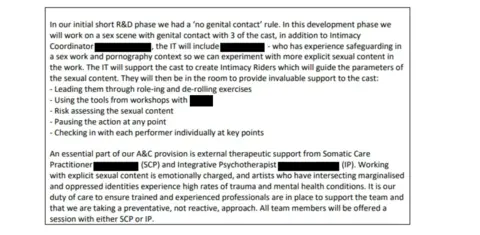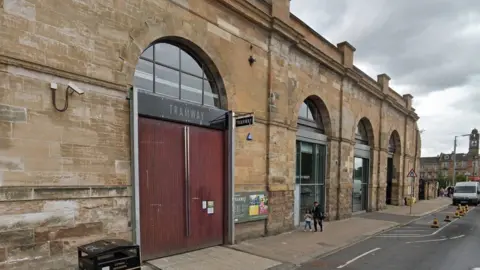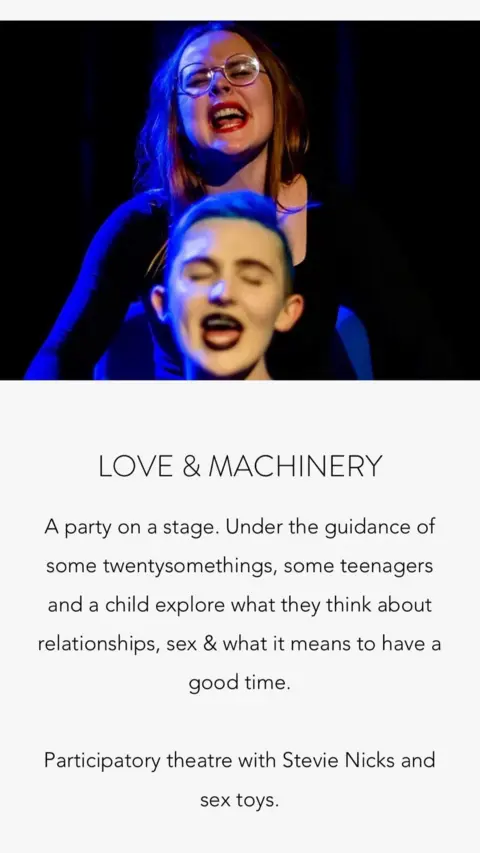Culture secretary demands answers on explicit art show
 Getty Images
Getty ImagesThe Scottish culture secretary has demanded an urgent meeting with Creative Scotland to discuss why an arts project involving real sex was given over £100,000 in funding.
Angus Robertson said he is "deeply concerned" about documents obtained by BBC Scotland News which show the original funding application made clear the project would involve real sex.
The funding body Creative Scotland axed support for the Rein project in March, claiming they had not realised that real sex would be a part of the event.
But Rein's application acknowledged that development would involve "a sex scene with genital contact" involving three members of the cast.
Mr Robertson said he has requested an urgent meeting with Creative Scotland's leadership to "discuss how confidence in the organisation can be restored".
Director Leonie Rae Gasson secured a total of more than £110,000 of lottery money from the arts body and was asked to hand £76,196 back.
Sex scene
Creative Scotland later said they had not realised the project involved real sex, but Rein's application acknowledged that development would involve "a sex scene with genital contact" involving three members of the cast.
It also stated that, where necessary, testing for sexually-transmitted infections (STIs) would be conducted before rehearsals.
The Rein funding application was accepted in January on a second attempt, after amendments suggested by Creative Scotland were included.
It said the show would "showcase pioneering Scottish creativity at an international scale" after premiering at Take Me Somewhere Festival in Glasgow in 2025.
Filming in an unnamed location in the Scottish Highlands was scheduled to begin on 24 May.
Performers would have been paid for filming as well as for rehearsals and training with a "kink and BDSM educator", the application said.

A spokesperson for Creative Scotland said they stood by their reading of it as “simulated performance”, even with the genital contact.
The application, obtained through freedom of information requests, said: "In our initial short R&D phase we had a no genital contact rule.
"In this development phase we will work on a sex scene with genital contact with three of the cast."
Creative Scotland also released evidence that it had advertised a casting call-out for dancers and sex workers, including those with disabilities, to take part in the show involving "non-simulated sex".
The page was deleted after Creative Scotland came under heavy criticism from politicians and feminist groups.
Women's rights group For Women Scotland said the proposed project dehumanised women and promoted "unhealthy and dangerous" relationships.
Creative Scotland initially supported the project as a "challenging, creatively ambitious piece of experimental performance art".
It was to involve using "pornographic processes" to film "non-simulated sex" in the Scottish Highlands and then show the footage on large screens.
Locations for filming were listed as Glasgow, Edinburgh, the Highlands and Camden in London.
There would also be workshops to engage audiences with paid bursaries for disabled participants.
 Google
GoogleCreative Scotland has now recovered £67,741 of the grants.
The arts body decided not to claim back the £8,359 already spent, mainly on sub-contracted freelancers, "in the interests of protecting the, often precarious, income" of these workers.
These included a British Sign Language translator who made a video version of the casting callout describing the explicit acts that would be part of the performance.
Partnership funding and support
Supporting partners of the project included Creative Scotland-funded arts and education charities Take Me Somewhere and The Work Room, which between them hosted three weeks of development days for Rein in 2022 and 2023 and had offered further support.
Both are based at The Tramway, a public arts venue funded by Creative Scotland and owned by Glasgow Life - the charity which runs Glasgow City Council's leisure facilities.
In a letter of support sent to Creative Scotland with the funding application, Take Me Somewhere confirmed its "enthusiastic support for Leonie Rae Gasson’s project Rein".
It said it was offering its own "package of in kind and financial support" for Rein.
Take Me Somewhere, which had almost £800,000 in funding from Creative Scotland between 2020 and 2023, had initially invited Ms Gasson to present Rein at its festival last October.
The Work Room has been awarded more than £1.8m from Creative Scotland since November 2020, including grants for "anti-ableist" and inclusive dance practice.

Ms Gasson, who is from London and is based in Glasgow, was employed by the Royal Conservatoire of Scotland until April and has worked with National Theatre of Scotland and the Tron Theatre.
Her previous work includes a project at the Traverse Theatre with Lyceum Youth Theatre involving "teenagers and a child" taking items from audience members' bags and making sex toys with them.
Mr Robertson expressed concern about the new details that emerged on Tuesday.
He said: "Based on this information that we’ve just seen today, I have a number of questions about how this project was awarded funding in the first place.
"I have requested an urgent meeting with the chief executive and chair of Creative Scotland to understand how the current position has transpired and discuss how confidence in the organisation can be restored."
Scottish Conservative deputy leader Meghan Gallacher said Creative Scotland had "some serious explaining to do" and added Mr Robertson was ultimately answerable.
“It appears they have misled the public over this scandal, in an attempt to cover their appalling misjudgement in awarding funding to this project," she said.
“The attempted cover-up is more inexcusable than the original poor decision-making. As a publicly-funded body, Creative Scotland have a duty not just to spend taxpayers’ cash wisely, but also to be fully transparent on how they do so."
Ms Gasson declined to speak to BBC Scotland.
